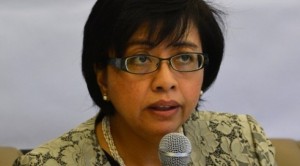Miriam Coronel-Ferrer: Gender was no problem in peace talks
University of the Philippines professor Miriam Coronel-Ferrer said she never felt discriminated against as a young girl, having been born to parents who liberally brought up their children.
But her appointment by President Benigno Aquino III as chief government negotiator in peace talks with the Moro Islamic Liberation Front (MILF) in 2012 had Ferrer confronting the challenges of being a woman.
“I think this was the only time in my life that I felt gender was such a disadvantage—when my gender was, at the beginning, an obstacle to assuming the [role as] chair [of the government peace panel],” Ferrer told the Inquirer in a recent interview.
While Ferrer has been a member of the peace panel since 2010, her appointment as chief negotiator meant she had to deal with her MILF counterpart, professor Mohagher Iqbal, squarely.
And in the Moro culture, men do not quarrel with women.
Article continues after this advertisementInitially, Ferrer said the MILF panel may have felt that “to a certain extent” her being a woman “ties their hands in terms of being firm and strong in the negotiation process.”
Article continues after this advertisementEven President Aquino expressed concern about appointing a woman chief negotiator, Ferrer said.
“The President has said that he was not antiwoman but he wondered if my negotiating partners were ready for a woman. He was concerned about that,” Ferrer recalled.
What made it tougher was that Ferrer chaired the government peace panel at a stage when both parties had to hammer out the details of the four annexes to the Framework Agreement on the Bangsamoro (FAB).
The FAB, the blueprint for the peace deal, has been largely credited as the work of Iqbal and Ferrer’s predecessor, now Supreme Court Associate Justice Marvic Leonen.
Getting to the framework took a long and arduous process for both peace panels. The talks began in 1997 and went through four Philippine presidencies.
Pressing deadline
Laying down the details, which would be written into the Bangsamoro basic law that would be scrutinized by Congress, was another journey that had a very pressing deadline.
Ferrer and Iqbal had to seal a peace deal before President Aquino ends his term in June 2016.
Not to mention that there are several other challenging stages that the peace agreement would have to go through, such as the passage of the Bangsamoro basic law and the plebiscite, before anyone could say the peace deal is truly a success.
Ferrer gave credit to the MILF in accepting her as the new government chief negotiator.
When it was announced that Leonen was to be appointed to the high court, the MILF immediately issued a statement saying that they would welcome a new counterpart regardless of gender and ethnicity.
“Of course, that also manifested that they were willing to try new things,” Ferrer said.
Certainly, things were different on the actual negotiating table, when each party had to discuss, bargain, meet halfway, without sacrificing what they were each standing up for.
But Ferrer, a young grandmother of three girls, carried on her responsibilities gracefully, as any confident, independent, and intelligent woman would.
Ferrer’s staff swears to her being such a hard worker. She is also patient when it comes to explaining the annexes.
In an even voice, and often with a smile, Ferrer would explain to reporters, who tend to repeat questions, what has been going on in the negotiations, especially the complicated parts of the annexes.
Ferrer said that as the chief negotiator, she had to hone her diplomatic skills.
Negotiations’ progress
For more than a year dealing with the ups and downs, Ferrer noted the “progression” in the peace negotiations.
“The last rounds have been a lot friendlier than when we were negotiating the wealth sharing annex and transitional arrangements and modalities,” Ferrer said.
She also said the negotiations had “always been on a principled plane.”
“So to use my counterpart’s words, when we closed [the] power sharing [annex], ‘We have bloodied each other but we have remained friends.’ It somehow means that for them, they also had to make a lot of adjustments culturally,” Ferrer said.
In fact, in one of the sessions in the recently concluded talks in Kuala Lumpur, where the two panels signed the normalization annex and reached a peace deal, Ferrer said the MILF panel made a “surprise friendly comment.”
“[They] said that it was very hard to bargain with a woman. But it was not meant in a bad light. It was meant probably as an appreciation of the fact that we can really level off on a lot of things,” Ferrer said.
With the four annexes finally completed, Ferrer said she felt excited because the signing of the Comprehensive Agreement on the Bangsamoro “marks the beginning of the next phase.”
“The bigger challenge really is the implementation phase and the tail end of this process. We can see there is a lot of trust and goodwill between the two parties. There is real commitment to see through the whole process. You can feel we are on the same page on a lot of things,” Ferrer said.
RELATED STORIES
Gov’t, MILF panels OK deal on wealth-sharing
Peace negotiator warns about impact of bombings on Mindanao peace process
Automatic appropriations for Bangsamoro ‘jewel in the crown’ in wealth sharing pact
